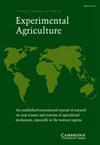斯里兰卡低地稻田中的可交换钼浓度受农业气候区、土壤类型和水源差异的影响
IF 1.9
4区 农林科学
Q1 Agricultural and Biological Sciences
引用次数: 0
摘要
摘要 钼(Mo)是植物必需的微量营养元素。然而,斯里兰卡稻田中的钼状况受气候和土壤的影响尚不清楚。本研究的目的是:(i) 确定斯里兰卡低地水稻田中可交换钼浓度的分布情况;(ii) 研究农业气候区(ACZ)、土壤类型、水源及其相互作用对可交换钼浓度的影响。采用分层随机抽样方法,共收集了 3,719 份土壤样本,分别代表 6 个农业气候区、6 个土壤等级和 3 个水源。在 0.01 M CaCl2 溶液中提取后测定可交换钼浓度,并使用电感耦合等离子体质谱法进行检测。土壤中的钼浓度变化范围为 0.01 至 245 微克/千克,平均值为 25.9 微克/千克。从湿润区,特别是湿润区低地采集的样本中,钼的浓度高于其他 ACZ 中的钼浓度。在测试的土壤类别中,组溶土的钼浓度较高,而其他土壤类别的钼浓度相近。雨水灌溉水田的钼含量高于补充灌溉水田。生成的空间地图可直观显示土壤钼浓度的地理差异。由于可交换钼浓度存在空间异质性,因此必须实施基于 ACZ、土壤和水源的战略,以改善斯里兰卡稻田的钼状况。本文章由计算机程序翻译,如有差异,请以英文原文为准。
Exchangeable molybdenum concentration in lowland paddy fields of Sri Lanka as affected by the differences in agro-climatic zones, soil orders, and water sources
Summary Molybdenum (Mo) is an essential micronutrient for plants. However, Mo status in Sri Lankan paddy fields as affected by climate and soil is not known. This study was conducted to (i) determine the distribution of exchangeable Mo concentration, and (ii) examine the interactive effects of the agro-climatic zone (ACZ), soil order, water source, and their interactions in determining exchangeable Mo concentration in lowland paddy fields of Sri Lanka. A total of 3,719 soil samples representing six ACZs, six soil orders, and three water sources were collected using a stratified random sampling approach. Exchangeable Mo concentration was determined after extracting in 0.01 M CaCl2 solution and detected using inductively coupled plasma-mass spectrometry. Soil Mo concentration varied in the range of 0.01 to 245 µg kg−1 with a mean of 25.9 µg kg−1 . Samples collected from the Wet zone, particularly Wet zone Low country, had higher Mo concentrations than those reported in other ACZs. Among the soil orders tested, Histosols had a higher Mo concentration while that in other soil orders was similar. Rainfed paddy fields had more Mo than supplementary irrigated paddy fields. Spatial maps were generated to visualise the geographical variation in soil Mo concentration. Due to the presence of a spatial heterogeneity of exchangeable Mo concentration, it is important to implement ACZ, soil, and water source-based strategies to improve Mo status in Sri Lankan paddy fields.
求助全文
通过发布文献求助,成功后即可免费获取论文全文。
去求助
来源期刊

Experimental Agriculture
农林科学-农艺学
CiteScore
2.50
自引率
6.20%
发文量
29
审稿时长
24 months
期刊介绍:
With a focus on the tropical and sub-tropical regions of the world, Experimental Agriculture publishes the results of original research on field, plantation and herbage crops grown for food or feed, or for industrial purposes, and on farming systems, including livestock and people. It reports experimental work designed to explain how crops respond to the environment in biological and physical terms, and on the social and economic issues that may influence the uptake of the results of research by policy makers and farmers, including the role of institutions and partnerships in delivering impact. The journal also publishes accounts and critical discussions of new quantitative and qualitative methods in agricultural and ecosystems research, and of contemporary issues arising in countries where agricultural production needs to develop rapidly. There is a regular book review section and occasional, often invited, reviews of research.
 求助内容:
求助内容: 应助结果提醒方式:
应助结果提醒方式:


